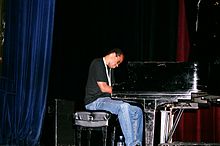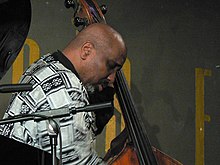By the Law of Music
| By the Law of Music | ||||
|---|---|---|---|---|
| Studio album by Matthew Shipp | ||||
|
Publication |
||||
| Label (s) | HatHut Records | |||
|
Format (s) |
CD |
|||
|
Title (number) |
13 |
|||
|
running time |
60:46 |
|||
| occupation | ||||
|
Studio (s) |
Seltzer Sound, New York City |
|||
|
||||
By the Law of Music is a music album by Matthew Shipp and his String Trio with William Parker and Mat Maneri . It was recorded on August 5, 1996 in New York City and was released in 1997 by HatHut Records . In 2002 the album was re-released by HatOLOGY.
The album
As early as the early 1990s, pianist Matthew Shipp had worked with bassist William Parker in David S. Ware's band ; from 1997 Shipp also played in the trio of violinist Mat Maneri. In addition to his productions for the Thirsty Ear label, of which he was artistic director for the Blue Series , he also released several albums for the HatHut label in the mid-1990s, including By the Law of Music , the first with his String Trio .
In his liner notes of the first edition from 1996, Ben Ratliff goes into Shipp's closeness to Johann Sebastian Bach and the classical composers of the 20th century; he quotes the statement of the pianist who thinks "he doesn't know what jazz is". In this sense, the music on the album, whatever you call it, contains a combination of "elements of free improvisation , melodic inventions and syncopated rhythms." Solitude , Duke Ellington's final standard, draws a connection to tradition, improvised music outside of preconceived notions.
- “ Ellington is my favorite mood creator ,” says Matthew Shipp, “ I think of piano as paint and sculpture, and when I think of it as paint, he's what I think of. "
Shipp's version of Solitude is aggressive: "The hot, rhythmic jungle sound of Ellington's bands of the late 1920s is something Shipp feels close to."
The first twelve tracks on the album consist of a suite , starting with the title track after a brief piano solo introduction. Dick Stafford said: "The composer compares his work to mathematics or a metaphysical formula and describes his work as a kinetic grid ."
“The principles of recapitulation and variation are in effect, with certain themes recurring in the dozen individual improvisations . [...] Shipp postulates various ideas as a clip, highly concentrated, occasionally relying on repetitive figures or microcosmic representations. […] He plays the two repetitions of Grid himself - a courageous impromptu piano at eye level with [Cecil] Taylor or [Keith] Jarrett . ”Free ensemble play, in which“ the trio grows into a force, are titles like Whole Movement or P X . "
As a chamber music trio session with the use of free improvisation and fragments of written out melodies, Ben Ratliff sees one of the obvious reference points for the Matthew Ship Trio in the Jimmy Giuffre Trio with Paul Bley at the end of the 1960s.
The collaboration of the Matthew Shipp String Trio continued in 1997 with the album Strata ; In 2011 the album Expansion, Power, Release (hatOLOGY 558), 2019 Symbolic Reality ( RogueArt ) was released.
Rating of the album
The album received consistently positive reviews; The music magazine CMJ New Music Monthly called 1998 By the Law of Music the highlight of Shipp's work to date and Jazz.com included the title track in the series of Twelve essential Matthew Shipp Tracks . Its author Steve Greenlee wrote:
- " When Shipp plays, you can hear him thinking. He seems always to be trying to reconcile his intellectual approach with his predilection to put his fist through the keys. Here's a good example. His analytical, mathematical mind begins to twist his own piece, and then his power takes over. All the while, Parker and Maneri must conform to his will and help him find his way, which they do. In less than three minutes, this tune takes us all over the map "
Steve Loewy, the Allmusic critic , rated the album four out of five stars, highlighting in his review "the romantic flair of Shipp's compositions, imbued with the spirit of elaborate discovery and complex connections, but what makes them so compelling is the style and character." The way she interprets the trio by making each piece sound like completeness. ”Shipp's compositions in particular are“ systematic constructions that, in retrospect, follow logical paths ”
Glenn Astarita called the album recommendable and wrote in All About Jazz in 2002 :
- " They venture into what has now become familiar territory - where the band delves into microtonal patterns, and shifting tonalities. The trio also implements various odd-metered time signatures amid a matrix-like platform. The album title might serve as an antithesis to the musicians' musical output. As they seemingly defy the laws of music via sequences of counterbalancing motifs, and free form improv interspersed with John Cage- like concepts. On "Fair Play," Parker establishes a fervent pace due to his steady, walking bass lines as Shipp and Maneri render interweaving statements that develop into subsequent mini-motifs. Otherwise, the respective musicians have made significant advances since the onset of this release . ".
Dick Stafford describes it as rich music, both in terms of its roots and its love of experimentation. The author goes into Shipp's role models Bud Powell and Thelonious Monk ; He also mentions Duke Ellington's influence on the touch and the orchestral style of this music. "Shameless continuation of the free sounds introduced in the late 1960s and 1970s by players like Cecil Taylor and Pharoah Sanders ."
The author also goes into the contributions of the violinist Mat Manieri, whose playing is "a fascinating mixture of conventional sounds and more experimental effects". William Parker is an equal part of the trio and his pizzicato style is particularly appropriate here. The innumerable influences in Shipp's playing are present in the various solo passages of the pianist. Even if the term free jazz is used for this , there is a “strong degree of control in the concept and in the performance of the band leader.” After the suite, it is “an additional pleasure to hear the more conventional Ellington piece as the final number on this record. With repeated playback I enjoyed this publication more and more and would recommend it to every listener who wants to try something a little bit experimental. "This is" art of high quality. "
The titles
- Matthew Shipp String Trio - By The Law Of Music (hatART CD 6200, hatOLOGY 574)
- Signal - 0:17
- By the Law of Music - 2:51
- Implicit - 6:58
- Fair Play - 5:00
- Grid - 6:45
- Whole Movement - 3:05
- Game of Control - 7:56
- Point to Point - 4:21
- PX - 3:28
- Grid - 5:36
- Coo - 5:05
- XZU - 4:31
- Solitude (Ellington) - 4:53
All other compositions are by Matthew Shipp.
Web links
- Review by Josef Woodard in JazzTimes
- Discogs
- Glenn Astarita: Review of the album (2002) in All About Jazz
- Review of Steve Loewy's album at Allmusic (English). Retrieved April 28, 2012.
- Dick Stafford
Notes and individual references
- ↑ a b c d Ben Ratliff, Liner Notes 1996.
- ↑ a b Dick Stafford
- ↑ a b Miscellaneous Titles at jazzshelf
- ^ Steve Holtje: New York City Free Jazz. In: CMJ New Music Monthly, Dec 1998
- ↑ Steve Greenlee: The Dozens: Twelve essential Matthew Shipp Tracks at Jazz.com ( Memento of the original from November 28, 2011 in the Internet Archive ) Info: The archive link was inserted automatically and has not yet been checked. Please check the original and archive link according to the instructions and then remove this notice.
- ↑ Original: Shipp's compositions show a romantic flair, imbued with a spirit of sophisticated discovery and complex relationships, but what makes them so compelling is the manner in which the trio interprets them, each piece ringing with a sense of completeness. Shipp's performances, in particular, are orderly constructs that in retrospect take thoroughly improvised logical paths.
- ↑ Review of Steve Loewy's album at Allmusic (English). Retrieved April 28, 2012.
- ↑ Astarita, All About Jazz


